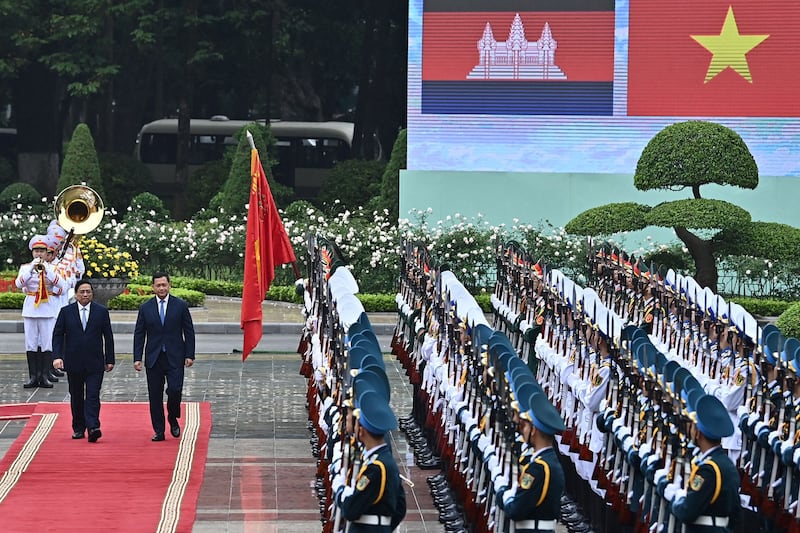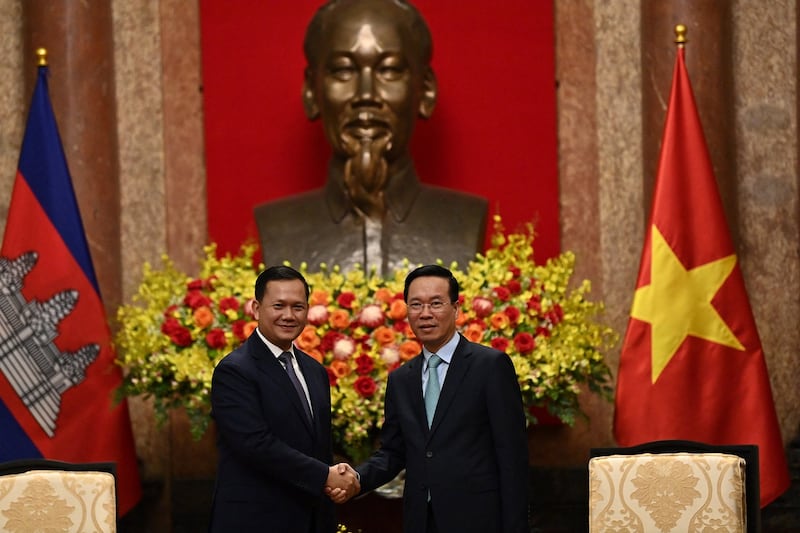Prime Minister Hun Manet arrived in Hanoi on Monday to start a two-day official visit, one of his first foreign trips since taking over as head of Cambodia’s government in August.
He met with Vietnamese Prime Minister Pham Minh Chinh and Communist Party General Secretary Nguyen Phu Trong, according to the Ministry of Foreign Affairs.
Hun Manet and Pham Minh Chinh signed a cooperation agreement between the Cambodian Chamber of Commerce and the Vietnam Chamber of Commerce and another agreement in the areas of science, technology and innovation, the ministry said in a statement.
Chinese President Xi Jinping is also expected to visit Hanoi this week, according to Reuters.
Hun Manet traveled to Beijing in October to attend China’s Belt and Road Initiative conference. In September, he addressed the U.N. General Assembly in New York.

On Sunday, the 46-year-old was named vice president of the ruling Cambodian People’s Party, or CPP – a move that allows him to meet with his Vietnamese counterparts on an equal level, according to Men Nath, a Norway-based representative of the Cambodia Watchdog Council.
“If he went to Vietnam just as a permanent member of the party, it would not be insufficient,” he said.
Border issues and immigration
Cambodia’s National Assembly officially selected Hun Manet as prime minister on Aug. 22. The formality took place about a month after the CPP swept a general election in which the country’s only viable opposition party wasn’t allowed to compete.
Just a few days later, longtime Prime Minister Hun Sen announced at a July 26 news conference that he would step down as prime minister and would begin a transition to Hun Manet, his eldest son.

After driving the Khmer Rouge from power in 1979, Vietnam administered Cambodia for more than a decade, appointing Hun Sen prime minister in 1985 and maintaining tens of thousands of troops on the ground.
Over the years, Hun Sen’s opponents have often attempted to paint him as a tool of the Vietnamese. He remains the head of the CPP.
Unresolved border issues between Cambodia and Vietnam, former French colonies from the 1860s to 1954, have regularly inflamed nationalist sentiment. The disputed border has sparked incidents in the past, with the construction by Vietnam of military posts in contested areas quickly challenged by Cambodian authorities in Phnom Penh.
Cambodian activists also cite the fact that nearly 1.3-million ethnic Khmer people live in a part of Vietnam that was once southeastern Cambodia. They have faced serious restrictions on freedom of expression, assembly and movement.
RFA was unable to reach foreign ministry spokesman An Sokhoeun or government spokesman Pen Bona for comment on Hun Manet’s visit.
Translated by Sum Sok Ry. Edited by Matt Reed and Malcolm Foster.
